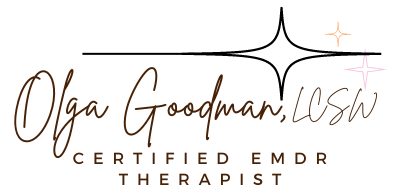Therapy for childhood trauma in San Diego & El Cajon, CA. In person & online.
Break free from what no longer serves you.
Do you feel that your past is haunting your present?
You keep having intrusive thoughts about different childhood experiences, but your mind tells you that you shouldn’t be so impacted by something that happened so long ago. Even if you know that one or both of your parents did the best they could, the loneliness, fear, shame, and anger of your childhood memories create real, visceral pain for you as an adult.
A part of you still longs for what was never there.
You find yourself having strong feelings in response to someone’s seemingly innocent comments and immediately feel ashamed of it. You learned creative ways to numb the emotional pain by using drugs or alcohol, overworking, avoiding relationships, people pleasing, the list goes on. These old ways of coping are catching up with you, making your life feel overwhelming and unmanageable. The sense of being “not enough” keeps weighing you down, interfering with your life goals and relationships.
Because of all the times you were let down, rejected, or abandoned by the people close to you growing up, you have difficulty trusting others. As an adult, you keep getting in relationships that hurt you and leave you feeling “broken” or “not deserving of love.” It feels urgent that you change something about yourself so you can finally experience the happiness other people seem to enjoy. You are so alert to all the things that could go wrong, that it’s hard to let go of the worries and worst-case scenarios. You are paralyzed with indecision and find it difficult to enjoy your life because you keep waiting for the other shoe to drop. Sometimes it becomes hard to believe something good might happen to you or someone will actually love you for who you are.
Helping you become the adult your younger self needed
Therapy focused on understanding and processing your childhood trauma will free you from the intrusive reminders about your past. You will learn to talk to yourself in a loving, validating, and accepting way, like you always wanted your parents to talk to you. As your relationship with yourself improves and you master healthy boundary setting, relationships with others will also become more satisfying.
We’ll begin by building a therapeutic relationship where you feel safe and supported. Therapy is a team effort; your expertise on what it is like to be you is invaluable.
You will develop deeper awareness of your emotions, blind spots, and behavioral patterns. You already have all the answers you are looking for: awareness practice will help you bring them to the surface.
We will move at your pace, allowing space for being challenged and for being held. You will be empowered to take charge of your healing, first in my therapy office, then outside of it.
Therapy for childhood trauma can help you to…
- Increase a sense of control when it comes to your emotions, thoughts, and behaviors.
- Improve self-esteem and self-acceptance
- Build secure attachment in relationships
- Process past painful memories, so they don’t get a reaction out of you in the present moment.
- Develop a solid skill toolbox to help you regulate your nervous system, no matter what happens around you.
- Put your skills and new perspectives into practice in your everyday life so you can build relationships that support your continued healing.
You don't have to choose between safety and connection. You can have both
Frequently Asked Questions
Q: What are the symptoms of childhood trauma?
Although there is no one way people respond to painful or traumatic events, some experiences are commonly associated with the history of childhood trauma. For instance, chronic anxiety, depressive episodes, anger outbursts, unexplained medical issues, or sleep disturbance indicate nervous system dysregulation resulting from trauma. In addition to that, avoidance behaviors, like workaholism, addictions, trust issues, codependence, or people pleasing, point at a history of trauma.
Q: What is the best therapy for childhood trauma?
Trauma is a physiological experience, so ways to treat it should involve both your mind and your body. That’s why just talk therapy is often not effective in addressing trauma. Some treatment modalities that have been successful in healing trauma include: Eye Movement Desensitization and Reprocessing (EMDR), somatic therapies, and Internal Family Systems IFS).
Painful childhood experiences often lead to attachment issues, which means disruption in one’s ability to connect with self and others. This makes it difficult to build healthy relationships in the present. Attachment based therapies are essential in helping to improve your relationships in the aftermath of childhood trauma.
I’m certified in EMDR and have been trained in all of the aforementioned types of therapy to help my clients heal childhood trauma.
Q: What causes childhood trauma?
Life events and interactions that threaten a child’s sense of safety and connection with their caregivers can be experienced as traumatic and have long lasting negative impacts. These experiences include a parent’s absence due to a busy work schedule, addiction, death, or divorce, chronic shaming and criticism, physical punishment, abuse and emotional neglect, etc. You really have to look at those experiences through the eyes of a child to fully understand their impact.
Q: What types of childhood trauma do you specialize in?
I have helped clients with childhood traumatic experiences ranging from physical and sexual abuse to emotional neglect, bullying, and religious abuse. Even if you don’t label your painful childhood experiences as ‘trauma,’ but they left you with negative beliefs about yourself or unhealthy coping mechanisms, it’s important to acknowledge and address their negative effects so you can improve your self-esteem and relationships. I am especially passionate about helping those who had to become adults too soon, had emotionally immature and narcissistic parents, or had to take care of their caregivers in any way.
My other specialty is working with adopted adults and treating the impacts of abandonment attachment wounds.
I also specialize in pre-verbal trauma. If you know you experienced stress or neglect in the early years of your life but don’t have specific memories to work with, we can use EMDR to access and heal those experiences for which you don’t have words.

